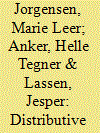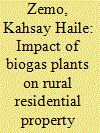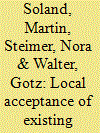|
|
|
Sort Order |
|
|
|
Items / Page
|
|
|
|
|
|
|
| Srl | Item |
| 1 |
ID:
125618


|
|
|
|
|
| Publication |
2013.
|
| Summary/Abstract |
After many years of stagnant growth in geothermal power generation, development plans for new geothermal plants have recently emerged throughout Japan. Through a literature review, we investigated the relationships between the principal barriers to geothermal development and we thereby analyzed the deciding factors in the future success of such enterprises. The results show that the societal acceptance of geothermal power by local stakeholders is the fundamental barrier as it affects almost all other barriers, such as financial, technical, and political risks. Thus, we conducted semi-structured interviews with 26 stakeholders including developers, hot spring inn managers, and local government officials. Some hot spring inn managers and local government officials noted that they have always been strongly concerned about the adverse effects of geothermal power generation on hot springs; their opposition has delayed decision-making by local governments regarding drilling permits, prolonged lead times, and caused other difficulties. A key reason for opposition was identified as uncertainty about the reversibility and predictability of the adverse effects on hot springs and other underground structures by geothermal power production and reinjection of hot water from reservoirs. Therefore, we discuss and recommend options for improving the risk management of hot springs near geothermal power plants.
|
|
|
|
|
|
|
|
|
|
|
|
|
|
|
|
| 2 |
ID:
171503


|
|
|
|
|
| Summary/Abstract |
To address increasing opposition to wind projects in Denmark three compensation schemes were introduced in the 2008 Renewable Energy Act. The aim was to address issues of distributive fairness and thereby to increase local acceptance. This paper analyses the role of two individual compensation schemes – the property value-loss scheme and the co-ownership scheme – on local citizens’ perceptions of fair distribution of the benefits and burdens of wind energy projects. The qualitative case study of three Danish wind energy projects discloses that distributive unfairness was a prevalent concern among local citizens, and that this concern was inseparable from perceptions of procedural fairness and recognition. The key conclusion is that the two compensation schemes are not successfully offsetting perceptions of unfair distribution. The schemes are challenged by a multitude of intertwined concerns. The compensation schemes are not equipped to address the plethora of non-monetary values affected by the wind projects. Specifically the compensation schemes are criticised for not offering adequate local benefits or distribution thereof, equal access, fair procedures and transparency. In fact the schemes were by some considered unfair and created perceptions of lack of recognition and bribery which undermined their role in promoting distributive fairness and local acceptance.
|
|
|
|
|
|
|
|
|
|
|
|
|
|
|
|
| 3 |
ID:
166541


|
|
|
|
|
| Summary/Abstract |
In this paper, we investigate the impact of large- and farm-scale biogas plants on the rural residential property values. We use data from 11,279 rural housing transactions in the period 2007–2015 and trace spatial effects of biogas plants on the local property market. Our results show that large biogas plants have a significant negative impact on rural residential property values while farm-scale biogas plants have a significant positive impact. The findings suggest that preferences for or against biogas plants cannot be explained by either a NIMBY or a PIMBY phenomenon and the paper explores potential reasons for the observed disparity in valuation of farm- and large-scale biogas plants. An economic impact assessment of the choice of facility type, based on a concrete case study, indicates that the impact on residential property values may tip the scale in favor of farm-scale biogas plants. Based on these results, policy implications for planning and expansion of biogas production are discussed.
|
|
|
|
|
|
|
|
|
|
|
|
|
|
|
|
| 4 |
ID:
150884


|
|
|
|
|
| Summary/Abstract |
The local acceptance of wind energy projects has received significant attention because local opposition is a barrier to implementing a wind energy project. To decrease objections from local residents, previous studies identified factors that evoke negative attitudes. However, little research has focused on the acceptance of people who remain silent. Therefore, the situation in which there is no marked opposition has been regarded as a success for the project. This research focused on the acceptance of people who are not objecting to a wind farm in their backyard and clarifies the implications of the silent situation. One of the principal findings is that while most of the respondents accept the existing local wind farm, they have negative attitudes towards a new wind farm. This result means that the silent situation does not support further wind development. We conclude that the purpose of consensus building needs to be set to encouraging local residents to express their opinions instead of simply aiming for the absence of opposing opinions. Finally, we discuss a council model through a budgetary provision, eliciting opinions from people who remain silent, and adaptable management as the policy implications for sustainable wind development.
|
|
|
|
|
|
|
|
|
|
|
|
|
|
|
|
| 5 |
ID:
125581


|
|
|
|
|
| Publication |
2013.
|
| Summary/Abstract |
After the Swiss government's decision to decommission its five nuclear power plants by 2035, energy production from wind, biomass, biogas and photovoltaic is expected to increase significantly. Due to its many aspects of a direct democracy, high levels of public acceptance are necessary if a substantial increase in new renewable energy power plants is to be achieved in Switzerland. A survey of 502 citizens living near 19 biogas plants was conducted as the basis for using structural equation modeling to measure the effects of perceived benefits, perceived costs, trust towards the plant operator, perceived smell, information received and participation options on citizens' acceptance of "their" biogas plant. Results show that local acceptance towards existing biogas power plants is relatively high in Switzerland. Perceived benefits and costs as well as trust towards the plant operator are highly correlated and have a significant effect on local acceptance. While smell perception and information received had a significant effect on local acceptance as well, no such effect was found for participation options. Reasons for the non-impact of participation options on local acceptance are discussed, and pathways for future research are presented.
|
|
|
|
|
|
|
|
|
|
|
|
|
|
|
|
| 6 |
ID:
105745


|
|
|
|
|
| Publication |
2011.
|
| Summary/Abstract |
The European 20-20-20 goals, as well as national targets for the next decade, require a substantial increase in installed renewable capacity in Germany. While public support for such measures is high on an abstract level, the situation in the local context is often very different. Here, the impact of renewable energy might cause resistance. Empirical research shows that a community ownership model can have a positive effect on local acceptance. Our study explores whether such an effect can also be demonstrated in a community co-ownership model. The question is relevant since larger projects exceed the financial possibilities of most communities, leaving them with only co-ownership as an option. The research design is based on a comparative case study, utilizing a questionnaire-based survey. The results of the survey clearly show that a significant difference in local acceptance exists between the two cases. The residents of Zschadraß, where a community co-ownership model exists, are consistently more positive towards local renewable energy and also towards renewable energy in general. The results provide evidence that the co-ownership model is a means to reconcile local acceptance with an increased use of renewable energy in Germany.
|
|
|
|
|
|
|
|
|
|
|
|
|
|
|
|
| 7 |
ID:
176888


|
|
|
|
|
| Summary/Abstract |
While renewable energy is an eco-friendly source of electricity, it can be difficult to garner local acceptance when securing sites for renewable energy projects. Local acceptance is an important factor in determining the success of these projects. To elicit local acceptance, governments can consider profit-sharing, in which project developers pay a subsidy to the locals to compensate for the inconvenience of a renewable energy facility. The purpose of this study is to analyze local acceptance levels for photovoltaic and wind power projects in Korea and to evaluate the impact of profit-sharing on the profitability of such projects. Contingent valuation is used to estimate willingness to accept for a baseline renewable energy project. A choice experiment is conducted to estimate a marginal willingness to accept for project attributes. These are combined to simulate the total willingness to accept needed to gain local acceptance. Total willingness to accept for baseline photovoltaic and wind power projects are, respectively, USD 13,815 and USD 27,587 per household for 5 years. Internal rate of return is employed to assess the profitability of such projects. This rate without profit-sharing ranges from 4.49% to 9.50%. Meanwhile, the rate with profit-sharing ranges from −1.67% to 7.64%.
|
|
|
|
|
|
|
|
|
|
|
|
|
|
|
|
| 8 |
ID:
168668


|
|
|
|
|
| Summary/Abstract |
This paper aims to identify the factors leading to strong wind energy development in Galicia from 1995 to 2009, in the absence of social conflict. Using participatory research techniques, our work indicates that the absence of local opposition is associated to the regulatory framework throughout this period. The central elements contributing to a better understanding of the success of this wind energy development with no social conflict are vertical decision-making and wind energy planning; the lack of institutional information and participation mechanisms and, above all, the process that declared it as Public Utility, thus opening the possibility of land expropriation. Our work concludes that, in the case under study, communities had no relevant role; their participation in the wind energy development process was a mere formality emptied of decision-making capacity. The scope of community benefits therefore became irrelevant in explaining wind dynamics within that territory.
|
|
|
|
|
|
|
|
|
|
|
|
|
|
|
|
|
|
|
|
|